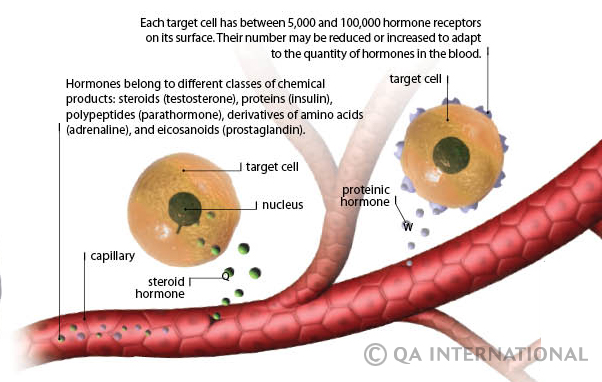
Hormones are remarkable chemical messengers that orchestrate a wide array of physiological processes in the human body. These tiny molecules wield immense influence, regulating everything from growth and metabolism to mood and reproduction. This comprehensive article delves into the fascinating world of hormones, exploring their types, functions, regulation, and their pivotal role in maintaining our overall health.
Understanding Hormones
Hormones are signaling molecules secreted by specialized glands and cells, often located in endocrine organs such as the pituitary gland, thyroid gland, adrenal glands, and the pancreas. They are also produced in other tissues, including the brain, heart, and digestive tract. Hormones travel through the bloodstream to target cells or organs, where they elicit specific responses.
Types of Hormones
Hormones can be categorized into several major types:
1. Peptide and Protein Hormones
These hormones are composed of amino acids and include insulin (regulates blood sugar), growth hormone (promotes growth and development), and oxytocin (involved in uterine contractions and bonding).
2. Steroid Hormones
Steroid hormones are derived from cholesterol and include sex hormones like estrogen, progesterone, and testosterone, as well as corticosteroids, which regulate stress response and inflammation.
3. Amine Hormones
Amine hormones are derived from amino acids and include thyroid hormones (regulating metabolism) and catecholamines (such as adrenaline and noradrenaline, involved in the “fight or flight” response).
4. Fatty Acid-Derived Hormones
These hormones are derived from fatty acids and include prostaglandins (involved in various bodily functions, including inflammation and blood flow regulation).
Functions of Hormones
Hormones play a pivotal role in numerous physiological processes, some of which include:
1. Regulation of Metabolism
Thyroid hormones, such as thyroxine (T4) and triiodothyronine (T3), control the body’s metabolic rate, influencing energy production and utilization.
2. Growth and Development
Growth hormone, insulin-like growth factors (IGFs), and sex hormones are crucial for growth and the development of secondary sexual characteristics.
3. Reproduction and Sexual Function
Sex hormones, including estrogen, progesterone, and testosterone, regulate reproductive processes, including the menstrual cycle, fertility, and the development of male and female sexual characteristics.
4. Stress Response
The adrenal glands release cortisol in response to stress, helping the body cope with challenging situations by increasing energy and suppressing inflammation.
5. Blood Sugar Regulation
Insulin, produced by the pancreas, regulates blood glucose levels by promoting the uptake of glucose into cells for energy or storage.
6. Mood and Emotions
Neurotransmitters like serotonin and dopamine, which act as hormonal messengers in the brain, play a role in mood regulation, emotional well-being, and mental health.
Hormone Regulation
The release of hormones is tightly regulated to maintain homeostasis in the body. Several factors influence hormone secretion, including:
1. Feedback Mechanisms
Most hormone systems operate on feedback loops. For example, when blood glucose levels rise, the pancreas releases insulin to lower them. Conversely, if glucose levels drop, the pancreas secretes glucagon to raise them.
2. Circadian Rhythms
Hormone secretion often follows a circadian rhythm, meaning it fluctuates throughout the day. For example, cortisol levels are highest in the morning, helping wake us up and provide energy for the day.
3. Neurotransmitters and Signals
The nervous system can trigger hormone release in response to specific signals or stimuli. For instance, the “fight or flight” response involves the rapid release of adrenaline and noradrenaline in response to stress.
4. Hormone Interactions
Hormones can also influence each other’s secretion. For example, the hypothalamus and pituitary gland work together to regulate thyroid hormone production.
Health Implications and Hormone Disorders
Imbalances in hormone production or signaling can lead to a range of health issues. Some common hormone-related conditions include:
- Diabetes: Insufficient insulin production or cellular resistance to its effects results in elevated blood sugar levels, leading to diabetes mellitus.
- Hypothyroidism and Hyperthyroidism: Disorders of the thyroid gland can cause an underactive (hypothyroidism) or overactive (hyperthyroidism) thyroid, affecting metabolism.
- Polycystic Ovary Syndrome (PCOS): An imbalance in sex hormones can lead to PCOS, characterized by irregular periods, cysts on the ovaries, and fertility problems.
- Hormone Replacement Therapy: Some individuals may require hormone replacement therapy to address deficiencies, such as estrogen replacement during menopause.
Conclusion
Hormones are the body’s chemical messengers, controlling a myriad of physiological processes that are essential for health and well-being. Their regulation is intricate and finely tuned, involving various glands and feedback mechanisms. An understanding of hormones is crucial not only for comprehending our bodies but also for diagnosing and treating hormonal imbalances and related disorders. As we continue to explore the complexities of the endocrine system, we gain deeper insights into the fundamental processes that sustain life itself.



